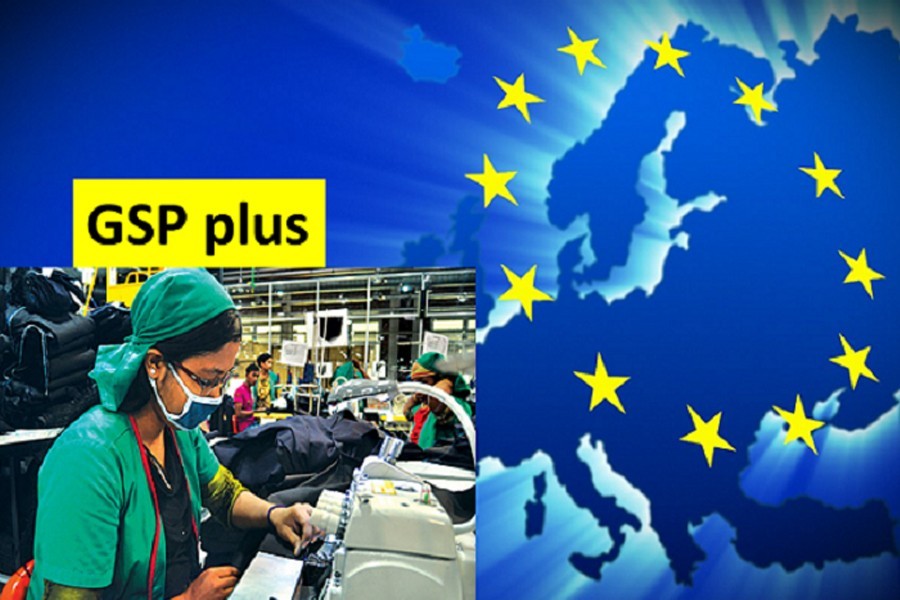Unless Bangladesh takes to climate protection, good governance, improves human-and labour rights and lowers the thresholds for exports to fit in a changed trade regime, a new framework of Generalised Scheme of Preferences (GSP Plus) proposed by the European Commission might limit the country's export of apparel and other important goods to the European Union (EU) market. The development has created a stir in trade circles.
The proposed framework, to be finalised by the European Parliament, provides for lowering temporary suspension of tariff preferences for highly competitive products by 10 per cent to create more space for the large industrial producers in sectors where they are competitive.
Such arrangement might curb Bangladesh's export of apparel, though the new dispensation aims at maximising the benefits from the GSP for the low-income countries. When the new framework comes into force, the GSP benefits for Bangladesh could be reduced, economists fear.
The new framework seeks an improvement upon the existing dispensation to ensure smooth transition for all countries in graduating from the status of least-developed countries (LDCs) over the next 10 years, according to a legislative proposal adopted by the European Commission for 2024-2034. And it is designed to enable the European Commission to apply special-incentive arrangement for sustainable development and good governance only if the LDCs agree to adopt strong sustainability standards to retain the GSP tariff preferences to access the EU market.
The proposed rearrangement for trade preferences is expected to set the general threshold at 47 per cent, down from 57 per cent, and the textile threshold at 37per cent, down from 47.2 per cent, to create greater space for the poorer developing countries. If the thresholds are lowered, Bangladesh's major exportable goods might not get the GSP benefits as their presence is already above these threshold levels. But, Bangladesh would possibly get some benefits from other items which it does not export much.
As a least-developed country (LDC), Bangladesh, would, however, continue to enjoy EU's existing modified GSP known as 'Everything But Arms (EBA)'. But this initiative is destined to expire in December 2025. After adoption, the EU countries would begin applying the new market-facilitation framework from 1 January 2026.
The European Union has already requested Bangladesh to prepare a roadmap to improve its labour standards to be able to continue to export to the European Union market at zero-rated duty for 10 more years. Annually, the EU countries import goods worth $18.7 billion from Bangladesh, that is, over 50 per cent its exports.
Bangladesh sent a six-year roadmap to the EU, agreeing to amend the labour law and rules to make them compatible with the ILO and EU labour standards by 2026, the graduation year.
Dhaka is negotiating with the EU to enjoy trade benefits after it graduates from the LDC group in 2026 over a three-year grace period up to 2029. The EU Parliament is expected to finalise the new framework by 2023. The draft framework contains five new points consistent with 27 international conventions related to human rights, labour rights, protection of the environment and climate, and good governance in order to strengthen enforcement and make withdrawal and suspensions easier.
In it, the EU, for the first time, is expected to allow the graduating countries to apply for the GSP-plus facility.
Bangladesh Knitwear Manufacturers and Exporters Association (BKMEA) amended its labour practices to protect workers' rights and thus avail of the GSP-plus window of opportunity. BKMEA leaders expect the government to provide policy support towards making the roadmap easier for the textile industry.
But, economists feel, the new framework could leave Bangladeshi woven garment exporters in some problems. Bangladesh Garment Manufacturers and Exporters Association (BGMEA), however, thinks the new framework would smooth the path of transition and it wants to retain the full GSP until 2029. BGMEA leaders said they would be in Brussels in November to pursue the matter.
They took the proposed framework in positive spirit as it lays importance on climate protection, and Bangladesh is more vulnerable to global climate crisis. It would strengthen EU's trade preferences to create economic opportunities and to advance sustainable development.
The framework would contain two additional human-rights instruments on the rights of people with disabilities and the rights of the child, two labour-rights conventions on labour inspections and tripartite dialogue and a governance convention on transnational organised crime.


